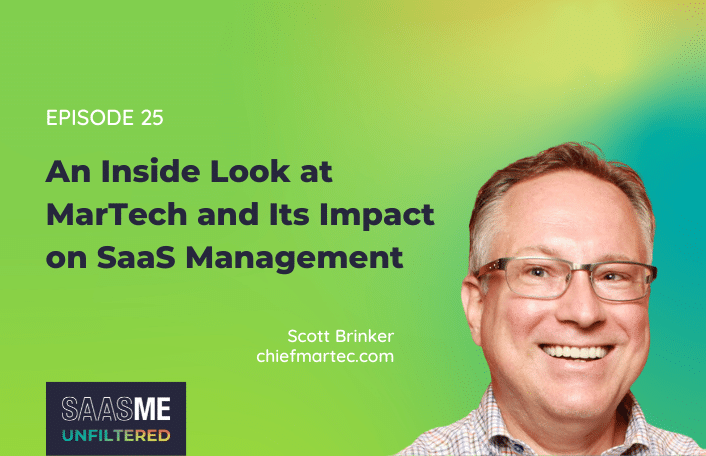06/23/2023
Table of Contents
From addressing ever-changing market conditions to driving business growth, marketing teams are often buying new and expensive software. Naturally, it’s important for them to be good stewards of those investments. At the same time, IT and Procurement must understand how marketers are thinking about their tech stack and the impact it has on buying, managing, and optimizing SaaS. In this episode, Scott Brinker, creator of the MarTech Landscape, weighs in on SaaS trends and what he sees ahead for MarTech.
Listen to the full episode on Spotify and Apple Podcasts.
Episode Summary
The number of marketing technologies has grown exponentially since Scott Brinker first started the MarTech Landscape in 2011. It’s the perfect example of how SaaS and software have sprawled and proliferated organizations worldwide.
“Year-over-year that landscape went from a couple hundred to a couple thousand to now well over 10,000,” said Brinker.
With that comes the challenge of extracting value while balancing efficiency, performance and experimentation.
“Marketers are trying to do this highwire act,” said Brinker, “of, ‘let’s standardize, let’s simplify, let’s make this as operationally efficient as possible. And we [also] have to be experimenting with this thing.’”
How can they be better stewards of their tech stack? And where does Procurement and IT fit in the picture? Listen to the full episode above or read on for highlights from our interview with Scott Brinker.
Guest Spotlight
Name: Scott Brinker
What he does: Editor for Chiefmartec.com and VP, Platform Ecosystem at HubSpot
Connect with Scott online: LinkedIn
Episode Highlights
The MarTech Landscape Continues to grow
“I created the first version of [the MarTech] landscape, not because I had a fetish with logos of SaaS companies, but because I was trying to persuade CMOs to think, ‘Look at all the tech you’re starting to become dependent on. You might want to be investing in some of the people resources to be able to manage this well.’ What I couldn’t have not expected, well I’m sure nobody expected, was year-over-year that landscape went from a couple hundred to a couple thousand to now well over 10,000.”
Efficiency, Performance & Experimentation Is A Balancing Act
“I think what’s challenging for marketing is they are… between a rock and a hard place. They have two masters they’re trying to serve. One master is exactly what you’re talking about, the efficiency. The whole shift of marketing into the digital age had very much brought this idea of performance marketing to the forefront of how marketers run their department, certainly how they’re held accountable for their department by senior leadership. But at the same time, marketing is in the business of trying to differentiate from competitors. It’s trying to break through an incredibly noisy market. Customers are continually shifting in their expectations and their channels. So, marketers have to chase that. Frankly, the reason why marketing technology keeps renewing with so many startups in the space is because these changes of how customers expect to be engaged with or what marketers have to do to reach them where they live is continuing to evolve. Marketers are trying to do this high wire act of like, ‘Yes, let’s standardize, let’s simplify, let’s make this as operationally efficient as possible. Oh, yeah, I guess we have to be experimenting with this thing and we might have to swap out this with this other thing.’ That’s a really tough balancing act, and my hat’s off to every CMO who’s leading that.”
It’s Not All about Return on Investment
“It is really hard to get perfect attribution for a whole bunch of philosophical reasons. We don’t have perfect data, but I would argue when we think about tool investments, it’s even harder. There are some tools that you can see a direct line of sight to ROI, where if it’s something like, ‘We’re running a series of events, we expect this to do a certain amount of demand generation.’ … But then you’ve got other tools… like project management. Well, marketers need project management and they need a good way to organize all the different things they’re doing. Trying to track that back to a specific ROI, that’s hard. I think if you say, ‘We’re not going to buy any tools unless there’s a really clear ROI path for it,’ I think you miss out on some of this deeper productivity capability that’s just important to businesses.”
The Future of MarTech is Platform Ecosystems
“I think you’re seeing the industry move away from these models where people have to, behind-the-scenes, pay large sums of money in order to get access. No, listen. People want this stuff. They want your core platform. They want an organizing principle, a center of gravity to their stack, but they want the ability to swap in. ‘Hey, we think this other product does this piece of what you do better. So, we love you for everything else, but we want to use this. Or there’s this new emerging technology that your team isn’t yet even looking at, but it’s really important to us in our industry, so we want to be able to move on that.’ I’m again biased, but I feel like suite versus best-of-breed really does need to give way to platform ecosystems.”
Governance Is Important But Must Allow for Experimentation
“From a compliance, privacy, security perspective, no one should adopt an app without IT, security, having visibility into this. If they have a whitelist of things like these are okay, these are not okay, if it’s a new one you haven’t used, you have to let us know about it so we can check it out. I’m 100%. That’s like a totally qualitatively different issue. You do not want to be going rogue with this software that way. I think the question of efficiency, that’s where I’m like, ‘That depends.’ Yes, a million project management tools, probably not efficient from the perspective of the moment you start wanting multiple people collaborating through these things, that becomes a mess. But when I start to look at things like ChatGPT and getting a subscription, I’m not sure if someone’s using ChatGPT. Yeah, maybe it gets access into Google Bard. All right, I guess that isn’t charged at the moment, but whatever these things are, I’m not sure that’s a bad thing. So, I was trying to think of this framework where what you care about is the net performance, productivity, and profit of the company. The heuristic is almost like if an individual is going to adopt an app, on the whole, does that contribute more to the overall productivity, performance, and profitability of the company, or does it detract from it?”
AI Is Going to Change the Ratio of Technology to People
“I think it’s really interesting times right now on this performance question, because we are entering a place here where some of these generative AI technologies have the potential to actually change quite significantly the ratio between where we’ve been investing in human resources and what we can get out of the technology. I’m not a doom and gloom person on this. I actually think the orchestration of things is where all the magic happens. The individual tasks have value, but it’s the orchestration where companies live and the AI isn’t solving that for us anytime soon. But when you do look at individual program execution, content marketing is probably the biggest example. There’s just some of these things where it’s very clear that this current generation of generative AI tools is going to change the ratio of technology to people and how we do things. It’ll just be interesting to see, particularly in this environment, where that change is happening and how marketers start to rebalance that portfolio between tech investment and people investment.”
Top Quotes
5:25 – “What I couldn’t have expected was year-over-year [the MarTech] landscape went from a couple hundred to a couple thousand to now well over 10,000.”
16:23 – “I think if you say, ‘We’re not going to buy any tools unless there’s a really clear ROI path for it,’ I think you miss out on some of this deeper productivity capability that’s just important to businesses.”
19:05 – “Suite versus best-of-breed really does need to give way to platform ecosystems.”
26:52 – “If an individual is going to adopt an app, does that contribute more to the overall productivity, performance, and profitability of the company, or does it detract from it?”
36:18 – “It’s very clear that this current generation of generative AI tools is going to change the ratio of technology to people and how we do things.”
Recommended Resources
Listen and subscribe to SaaSMe Unfiltered wherever you listen to podcasts.
ABOUT THE AUTHOR

Cory Wheeler
As Zylo’s Chief Customer Officer, Cory is responsible for helping our customers drive ROI and SaaS Management success with Zylo. He helps companies of all sizes effectively discover, optimize, and govern their SaaS through Zylo’s platform and services. Prior to founding Zylo, Cory spent 15 years in finance and procurement, managing categories and sourcing teams at Arthur Andersen, BearingPoint, and both Takeda and Astellas Pharmaceuticals. He built the procurement organization at ExactTarget, and managed the integration with the Salesforce Marketing Cloud procurement organization in 2015. He and his family reside in Indianapolis, IN, where they can be found cheering for the Purdue Boilermakers and Chicago Cubs.
